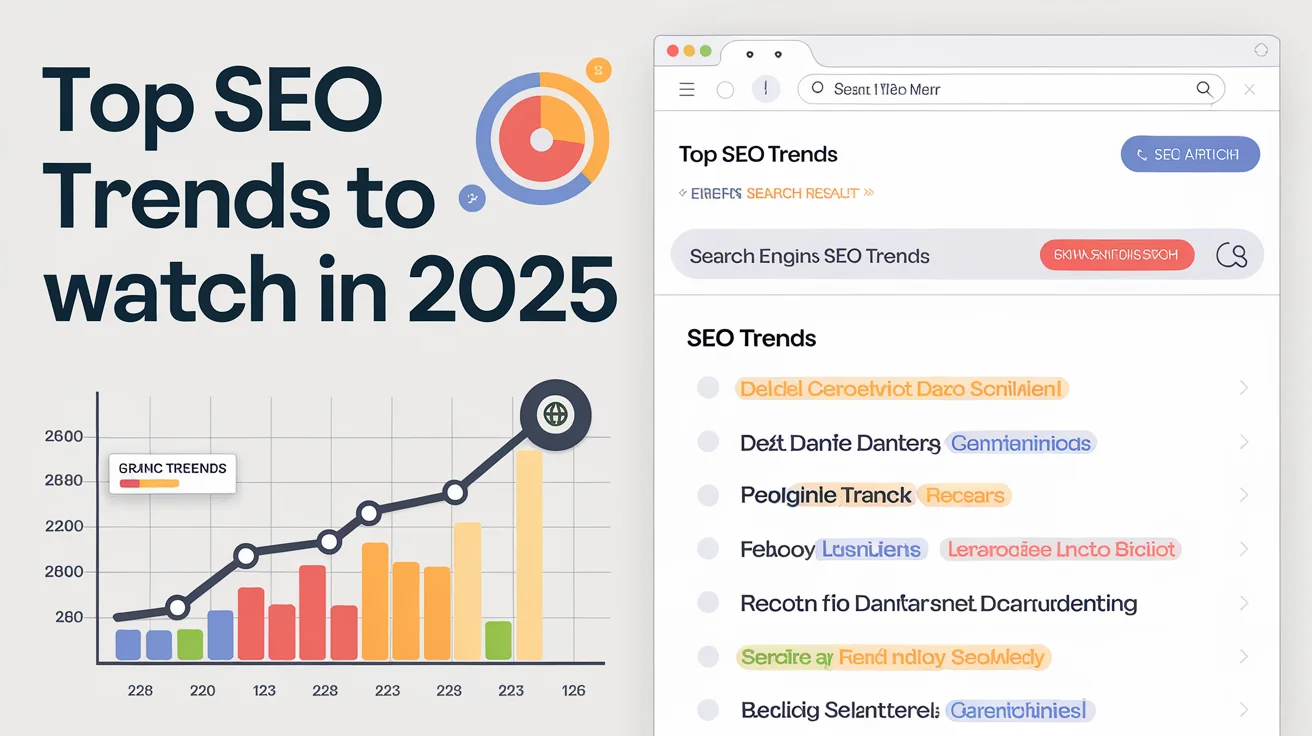As we step into 2025, the digital landscape continues to evolve rapidly, making it essential for businesses and digital marketers to stay current with the top SEO trends to watch in the year ahead to remain competitive and visible online.
Search Engine Optimisation (SEO) remains at the heart of online marketing strategies, and staying up-to-date with the latest shifts can significantly impact a website’s performance in search rankings.
In this article, we will dive into the Top SEO Trends to watch in 2025, focusing on the emerging trends that can help you improve your online presence and drive more traffic to your site.
AI-Powered SEO Tools and Automation
Artificial intelligence (AI) is transforming how we approach search engine optimisation (SEO) in 2025. From keyword analysis to content generation, AI tools are making SEO more intelligent and efficient. They help marketers understand user intent and create optimised strategies based on real-time data.
Google’s algorithms, such as RankBrain, utilise machine learning to refine search results. This means the focus is shifting from keyword stuffing to meaningful content that matches user queries. AI also helps detect trends, analyse competitors, and automate on-page SEO tasks.
Using AI tools like Surfer SEO, Jasper, or ChatGPT, marketers can now generate meta descriptions, identify ranking gaps, and track performance metrics. This results in faster outcomes, reduced manual effort, and higher-quality SEO content.
Benefits of AI-Powered SEO in 2025:
- Smarter keyword targeting with intent-based suggestions
- Automated technical SEO audits and recommendations
- Enhanced content optimisation with real-time competitor data
AI is not just a trend — it’s becoming the foundation of efficient and scalable search engine optimisation (SEO). Those who adopt AI tools early will gain a competitive advantage in search visibility and content performance.
Voice Search Optimisation

With the rise of smart assistants like Google Assistant, Siri, and Alexa, voice search has become an integral part of our interaction with technology. By 2025, voice search is expected to account for a larger portion of searches than ever before. As a result, optimising content for voice search is no longer optional. It’s a necessity.
Voice search queries tend to be more conversational than text-based searches. People ask questions in a natural, conversational tone, and this is something that SEO strategies must accommodate. Using natural language, long-tail keywords, and ensuring content answers questions directly will help improve visibility in voice search results.
Mobile-First Indexing and User Experience
Google now uses mobile-first indexing, meaning it primarily crawls and indexes the mobile version of your website before the desktop version. If your site isn’t optimised for mobile devices, it may not perform well in search engine rankings. Since most users search from their smartphones, having a mobile-friendly site is no longer optional; it’s essential.
Your website must offer a responsive design, fast loading speed, and clear, easy navigation on all screen sizes. Poor mobile usability leads to higher bounce rates, which negatively affects your site’s performance in Google’s eyes. A clean mobile experience enhances user engagement, increases time spent on-site, and drives conversions.
Additionally, user experience (UX) is now a key factor in ranking. Google evaluates how users interact with your pages through Core Web Vitals, including metrics like loading time, interactivity, and visual stability. In 2025, websites that prioritise smooth and user-friendly experiences will dominate the search results.
Video SEO and Visual Content Optimisation
Video SEO and visual content optimisation involve making your video and image content easy for search engines like Google to understand and rank. In 2025, visual content, especially videos, will play a significantly larger role in SEO strategies.
People engage with videos much faster than with plain text, and search engines are aware of this. That’s why websites with properly optimised videos and images are more likely to rank higher in search results.
How Video SEO works:
To make your videos SEO-friendly, use relevant keywords in the video title, description, and tags. Adding transcripts and closed captions helps search engines understand your video better and also improves accessibility for users.
For example, if you post a video tutorial on your blog, ensure the video has a keyword-rich title, a clear description of its content, and relevant tags. Also, embed the video on a well-optimised page that includes supporting text content. This combination enhances your chances of ranking on both Google Search and video platforms, such as YouTube.
Optimising your images is just as important. Use descriptive file names, alt text, and compress images to achieve a faster loading speed. Fast-loading and relevant visuals enhance user experience, which is a key ranking factor in 2025.
Key SEO Trends to Watch for in 2025:
- Featured Snippets: Featured snippets, also known as “position zero,” will continue to grow in importance. Optimising for these quick, informative results will help increase visibility.
- Core Web Vitals: User experience metrics, such as Core Web Vitals, will become even more crucial. These metrics measure page load speed, interactivity, and visual stability.
- Content Depth and E-A-T (Expertise, Authoritativeness, Trustworthiness): Google’s focus on E-A-T means that content must not only be informative but also credible and authoritative.
The Continued Growth of Local SEO
Local SEO is crucial for businesses that cater to a specific geographic region. With an increasing number of people using mobile devices to search for nearby companies, optimising for local search has become a crucial SEO trend. In 2025, local SEO will continue to be an essential strategy for driving foot traffic and regional awareness.
Businesses must ensure their Google My Business profile is complete and up-to-date, encourage customer reviews, and optimise their content for location-based searches. Additionally, local backlinks and content relevant to your location will further enhance your rankings in local search results.
Structured Data and Schema Markup
Structured data and schema markup help search engines understand the content on your website in greater detail. In 2025, utilising schema markup will become even more important as Google continues to refine its search algorithms to provide more accurate and relevant results.
By adding schema markup to your website, you help search engines display rich snippets in search results, such as star ratings, prices, or event details. This not only improves your chances of ranking but also enhances user experience by providing more information directly in search results.
Final Thoughts
The SEO landscape is constantly evolving, and staying ahead of these changes is essential for maintaining a competitive edge in search rankings.
From AI-powered tools to voice search optimisation, these Top SEO Trends to Watch in 2025 highlight the growing importance of user experience, content quality, and mobile optimisation.
By adapting to these trends and incorporating them into your SEO strategy, you can ensure that your website remains visible, relevant, and well-ranked in search results for years to come.
By focusing on semantic SEO, staying up-to-date with Google’s algorithm changes, and prioritising user experience, you will be well-positioned to drive traffic and achieve long-term SEO success.
Continue to monitor these trends and be prepared to adjust your strategies to stay competitive in the ever-evolving digital landscape.
FAQ:
Q1. What are the SEO Trends to Watch in 2025?
Answer: The top SEO trends in 2025 include AI-powered tools, voice search optimisation, mobile-first indexing, video SEO, local SEO, and structured data. These trends focus on enhancing user experience, improving content relevance, and increasing search visibility.
Q2. Why is AI important in SEO for 2025?
Answer: AI helps analyse search intent, automate SEO processes, and improve content relevance. Tools like RankBrain enable Google to deliver more accurate search results, making AI a crucial component for achieving SEO success.
Q3. How can I optimise my website for voice search in 2025?
Answer: Use natural language, long-tail keywords, and answer questions directly in your content. Structure your content to sound conversational, as voice queries are more human-like.
Q4. What role does mobile-first indexing play in SEO?
Answer: Google prioritises mobile-friendly websites. A fast loading speed, responsive design, and smooth navigation are essential for improving rankings under mobile-first indexing.
Q5. Why is video content important for SEO in 2025?
Answer: Video content increases user engagement and dwell time. Optimised videos, complete with proper titles, tags, and captions, can rank higher and even appear in video carousels on search engine results pages (SERPS).
Q6. What is structured data, and how does it affect SEO?
Answer: Structured data or schema markup helps search engines understand the content on your website. It enhances your listings with rich snippets, improving visibility and click-through rates.
Q7. How does E-A-T influence search rankings in 2025?
Answer: E-A-T (Expertise, Authoritativeness, Trustworthiness) ensures your content is credible and high-quality. Google rewards content from trusted sources with higher rankings.



